Empowering audiences through dance
I Matter, an interactive dance performance directed by LAU lecturer Dr. Nadra Assaf, creates a profound impact on unsuspecting audiences.
Dr. Nadra Assaf, lecturer of English and dance at LAU, describes being “flabbergasted” by the overwhelmingly positive reactions to her most recent dance production, I Matter.
Performed 15 times throughout May at Monnot Theater by 17 members of Assaf’s Al-Sarab Dance Troupe, the interactive theatrical dance piece plays on the philosophy that anyone and everyone, at any moment in time, matters and makes a difference in the big picture sense.
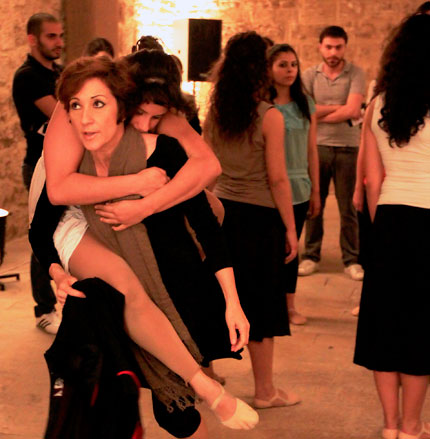 This concept is demonstrated throughout the performance by relying on audience members to play central roles in the progression of the dance, as opposed to merely sitting and watching.
This concept is demonstrated throughout the performance by relying on audience members to play central roles in the progression of the dance, as opposed to merely sitting and watching.
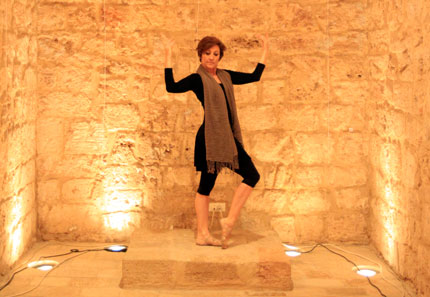 The dance, which was written, choreographed and directed by Assaf (photo above), was unlike any other audiences were likely to encounter. When audience members arrived at theater, they stepped into an old, underground room made of stone where they blended in with the dancers wearing regular street garb. Assaf waited in an adjacent room until everyone had arrived and started to draw their attention through a series of movements.
The dance, which was written, choreographed and directed by Assaf (photo above), was unlike any other audiences were likely to encounter. When audience members arrived at theater, they stepped into an old, underground room made of stone where they blended in with the dancers wearing regular street garb. Assaf waited in an adjacent room until everyone had arrived and started to draw their attention through a series of movements.
As they crowded around, Assaf placed the audience and dancers in strategic locations throughout the room, while giving a monologue about why people matter.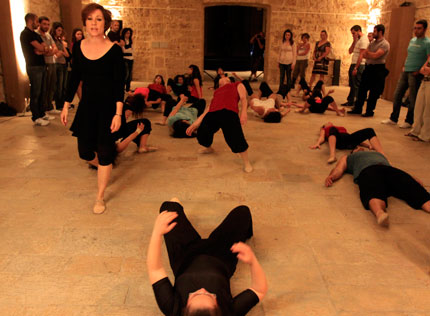 When the stage was set, Assaf gave a cue for all the performers to fall to the ground, except one who began dancing around the audience. Other dancers slowly picked themselves up and began dancing too.
When the stage was set, Assaf gave a cue for all the performers to fall to the ground, except one who began dancing around the audience. Other dancers slowly picked themselves up and began dancing too.
“Then the music plays and an interesting interaction starts to take place between the audience and dancers,” Assaf says. “Every night the audience did different things.”
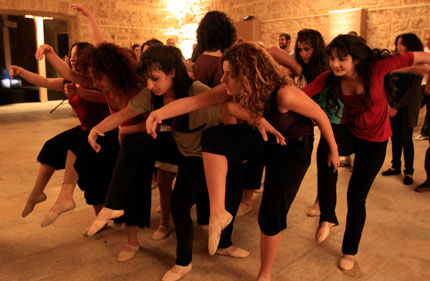 Following the first part of the performance that left audiences clueless of what to expect next, the dancers escorted them to a different room where they sat together and watched a piece performed by two of the dancers. Afterwards, the dancers took them back into the first room where they all danced together.
Following the first part of the performance that left audiences clueless of what to expect next, the dancers escorted them to a different room where they sat together and watched a piece performed by two of the dancers. Afterwards, the dancers took them back into the first room where they all danced together.
At the end of the performance, the dancers took the audience onto a stage where they moved together to an upbeat Spanish oriental rhythm. “Then the dancers jump off stage and we clap for the audience that are on stage,” Assaf says. “The audience become the performers and the performers become the audience.”
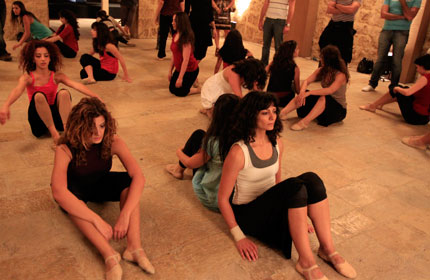 Assaf says the production intended to serve two purposes. “I was trying to make people understand that at any moment in time … they are important and they matter, no matter what their role is,” she says. “Even if their role is standing in the corner, arms crossed, not wanting to participate, they matter because that energy makes a difference.”
Assaf says the production intended to serve two purposes. “I was trying to make people understand that at any moment in time … they are important and they matter, no matter what their role is,” she says. “Even if their role is standing in the corner, arms crossed, not wanting to participate, they matter because that energy makes a difference.”
“Second, I was really interested in getting the audience to understand and appreciate dance in a different way because I have a serious problem with how people in Lebanon perceive dance. They perceive dance as that which is dabke or oriental with extravagant costumes, but that is not all what dance is about.”
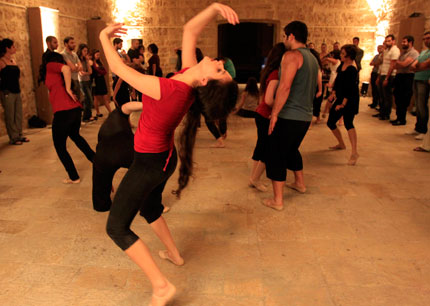 The first round of the project consisted of nine performances with 347 attendees. The second round, which was sponsored by LAU’s School of Arts and Sciences in Byblos after realizing the success it had drawn, consisted of six performances gathering 187 attendees.
The first round of the project consisted of nine performances with 347 attendees. The second round, which was sponsored by LAU’s School of Arts and Sciences in Byblos after realizing the success it had drawn, consisted of six performances gathering 187 attendees.
“I’ve never repeated the same performance more than seven times,” Assaf says, explaining how emotionally and physically tiring the performances are on the dancers and organizers.
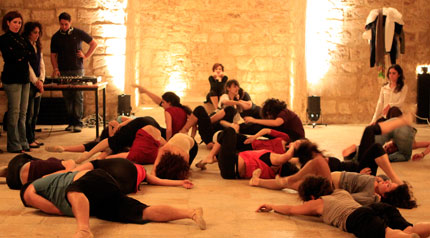 Each performance was limited to 35 audience members in order to create an intimate and powerful interaction between the audience and dancers. But on some days when they reached the quota, they found people outside the theater begging to come in. So Assaf allowed as many as 50 people to take part.
Each performance was limited to 35 audience members in order to create an intimate and powerful interaction between the audience and dancers. But on some days when they reached the quota, they found people outside the theater begging to come in. So Assaf allowed as many as 50 people to take part.
“We had all ranges of emotions from crying to joy,” Assaf says. “There was one lady on the last night of the performance who couldn’t stop laughing. I went up to her and asked what’s the matter and she said, ‘I’m not laughing at you, I’m just so happy, I can’t believe I’m doing this!’”
More
Latest Stories
- Into the Psychology of Justice
- Alumnus Zak Kassas on Navigation, Spoofing and the Future of GPS
- Hearing Between the Lines
- LAU Hematology Conference 2025: Advancing Science Through Interdisciplinary Exchange
- Dr. Chaouki T. Abdallah Invested as LAU’s 10th President
- LAU Guides Its Students Through the Code of Conduct
- Innovative Procedure at LAU Medical Center–Rizk Hospital Signals Hope for a Patient With a Congenital Disease
- LAU’s Inaugural PodChat Session Addresses AI Detection in the Classroom

